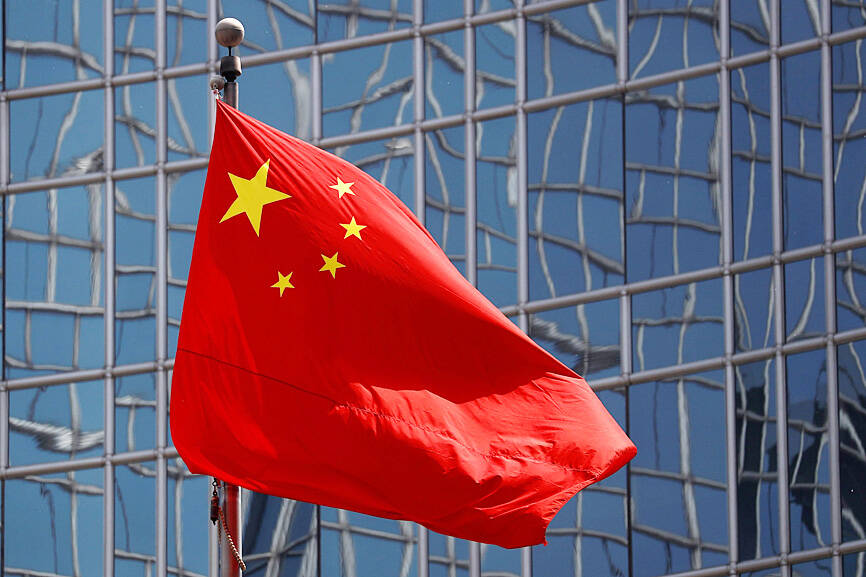China on Thursday announced sanctions against two US defense companies over what it called their support for arms sales to Taiwan.
The announcement freezes the assets of General Atomics Aeronautical Systems and General Dynamics Land Systems held within China. It also bars the companies’ management from entering the country.
Filings showed that General Dynamics operates a half-dozen Gulfstream and jet aviation service operations in China, which remains heavily reliant on foreign aerospace technology even as it attempts to build its own presence in the field. The company also helps make the Abrams tanks Taiwan is purchasing to replace outdated armor.

Photo: Reuters
General Atomics produces the Predator and Reaper drones used by the US military.
Chinese authorities did not go into details about the company’s alleged involvement in supplying arms to Taiwan.
Beijing has long threatened such sanctions, but has rarely issued them as its economy reels from the COVID-19 pandemic, high unemployment and a sharp decline in foreign investment.
“The continued US arms sales to China’s Taiwan region seriously violate the ‘one China’ principle and the provisions of the three China-US joint communiques interfere in China’s internal affairs, and undermine China’s sovereignty and territorial integrity,” the Chinese Ministry of Foreign Affairs said in a statement.
Sanctions were leveled under Beijing’s recently enacted Anti-Foreign Sanctions Law, which was established in retaliation against US financial and travel restrictions on Chinese officials accused of human rights abuses in China and Hong Kong.
General Dynamics’ fully owned entities are registered in Hong Kong.
The two companies did not immediately respond to requests for comment.
China banned US firms Lockheed Martin Corp and Raytheon Missiles & Defense from the Chinese market in retaliation, as one of their planes and a missile was used to shoot down a suspected spy balloon that flew over the US last year.
Similar balloons have frequently been discovered floating over Taiwan and into the Pacific Ocean.
Despite their lack of formal diplomatic ties, the US remains Taiwan’s most important source of diplomatic support and supplier of military hardware, from fighter jets to air defense systems.
Taiwan has also been investing heavily in its own defense industry, producing sophisticated missiles and submarines.

Chinese Nationalist Party (KMT) Chairman Eric Chu (朱立倫), spokeswoman Yang Chih-yu (楊智伃) and Legislator Hsieh Lung-chieh (謝龍介) would be summoned by police for questioning for leading an illegal assembly on Thursday evening last week, Minister of the Interior Liu Shyh-fang (劉世芳) said today. The three KMT officials led an assembly outside the Taipei City Prosecutors’ Office, a restricted area where public assembly is not allowed, protesting the questioning of several KMT staff and searches of KMT headquarters and offices in a recall petition forgery case. Chu, Yang and Hsieh are all suspected of contravening the Assembly and Parade Act (集會遊行法) by holding

PRAISE: Japanese visitor Takashi Kubota said the Taiwanese temple architecture images showcased in the AI Art Gallery were the most impressive displays he saw Taiwan does not have an official pavilion at the World Expo in Osaka, Japan, because of its diplomatic predicament, but the government-backed Tech World pavilion is drawing interest with its unique recreations of works by Taiwanese artists. The pavilion features an artificial intelligence (AI)-based art gallery showcasing works of famous Taiwanese artists from the Japanese colonial period using innovative technologies. Among its main simulated displays are Eastern gouache paintings by Chen Chin (陳進), Lin Yu-shan (林玉山) and Kuo Hsueh-hu (郭雪湖), who were the three young Taiwanese painters selected for the East Asian Painting exhibition in 1927. Gouache is a water-based

Taiwan would welcome the return of Honduras as a diplomatic ally if its next president decides to make such a move, Minister of Foreign Affairs Lin Chia-lung (林佳龍) said yesterday. “Of course, we would welcome Honduras if they want to restore diplomatic ties with Taiwan after their elections,” Lin said at a meeting of the legislature’s Foreign Affairs and National Defense Committee, when asked to comment on statements made by two of the three Honduran presidential candidates during the presidential campaign in the Central American country. Taiwan is paying close attention to the region as a whole in the wake of a

OFF-TARGET: More than 30,000 participants were expected to take part in the Games next month, but only 6,550 foreign and 19,400 Taiwanese athletes have registered Taipei city councilors yesterday blasted the organizers of next month’s World Masters Games over sudden timetable and venue changes, which they said have caused thousands of participants to back out of the international sporting event, among other organizational issues. They also cited visa delays and political interference by China as reasons many foreign athletes are requesting refunds for the event, to be held from May 17 to 30. Jointly organized by the Taipei and New Taipei City governments, the games have been rocked by numerous controversies since preparations began in 2020. Taipei City Councilor Lin Yen-feng (林延鳳) said yesterday that new measures by